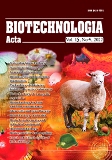ISSN 2410-7751 (Print)
ISSN 2410-776X (Online)

Biotechnologia Acta V. 15, No. 4, 2022
P. 11-14. Bibliography 5, Engl.
UDC: 615.076.9:571.27
https://doi.org/10.15407/biotech15.04.011
N.I. Fedosova, T.V. Symchych, A.V. Chumak, V.M. Shcherbina, N.L. Cheremshenko, O.M. Karaman
Kavetsky Institute of Experimental Pathology, Oncology and Radiobiology of NAS of Ukraine, Kyiv
Aim. The purpose of the study was to evaluate the effect of B. subtilis IMV B-7724 lectin on the functional activity of macrophages (Mph) and natural killer cells (NK) of intact Balb/c mice.
Materials and Methods. Balb/c mice were subjected to 10 consecutive administrations of the lectin in a dose of 1 mg/kg of body weight. The functional activity of peritoneal Mph and NK were studied. Statistical analysis of the results was performed according to the widely accepted methods of variational statistics.
Results. Administration of bacterial lectin increased Mph and NK cytotoxic activity; maximal increase was registered after the complete course of injections. A significant increase in the NO production indicates the polarization of peritoneal Mph into pro-inflammatory type M1. The transcription factors of IRF (at the early stage) and STAT (at the latter stages) signalling pathways were involved in the process of Mph polarization.
Conclusion. The ability of B. subtillis IMV B-7724 lectin to increase in vivo cytotoxic activity of innate immunity effectors and to maintain the long-term Mph M1 polarization urges further studies on the lectin effectiveness.
Key words: B. subtilis IMV B-7724 lectin, macrophages, natural killer cells, functional activity, STAT, IRF
© Palladin Institute of Biochemistry of the National Academy of Sciences of Ukraine, 2022
References
1. Mazalovska M., Kouokam J. C. Plant-derived lectins as potential cancer therapeutics and diagnostic tools.Biomed. Res. Int., 2020, 1631394. https://doi.org/10.1155/2020/1631394
2. Podgorsky V. S., Kovalenko E. A., Karpova I. S., Sashchuk E. V., Get'man E. I. Extracellular lectins of saprophytic strains of bacteria of the genus Bacillus. Prikl. Biokhim. Mikrobiol. 2014, 50(3): 256?63. (In Russian)
3. Fedosova N. I., Cheremshenko N. L., Hetman K. I., Symchyc T. V., Chumak A. V., Shliahovenko V. O., Voyeykova I. M., Didenko G. V. Physicochemical and cytotoxicity properties of Bacillus subtilis ІМV В-7724 extracellular lectin. Mikrobiol. Z., 2021, 83, 39–48. https://doi.org/10.15407/microbiolj83.01.039
4. Wu S. Y., Fu T., Jiang Y. Z., Shao Z. M. Natural killer cells in cancer biology and therapy. Mol. Cancer., 2020, 19(1), 120. https://doi.org/10.1186/s12943-020-01238-x
5. Jayasingam S. D., Citartan M., Thang T. H., Mat Zin A. A., Ang K. C., Ch'ng E. S. Evaluating the polarization of tumor-associated macrophages into M1 and M2 phenotypes in human cancer tissue: technicalities and challenges in routine clinical practice. Front. Oncol. 2020. 9. 1512. https://doi.org/10.3389/fonc.2019.01512
6. Chumak A. V., Fedosova N. I., Shcherbina V. M., Cheremshenko N. L., Karaman O. M., Chekhun V. F. Influence of bacterial lectin on key regulatory links of functional activity of macrophages of mice with ehrlich carcinoma. Exp. Oncol. 2021, 43(3), 197?203. https://doi.org/10.32471/exp-oncology.2312-8852.vol-43-no-3.16537.
7 Chernikov O. V., Wong W. T., Li L. H., Chikalovets I. V., Molchanova V. I., Wu S. H., Liao J. H., Hua K. F. A GalNAc/Gal-specific lectin from the sea mussel Crenomytilus grayanus modulates immune response in macrophages and in mice. Sci. Rep. 2017, 7(1), 6315. https://doi.org/10.1038/s41598-017-06647-5.
8. H?rhold F., Eisel D., Oswald M., Kolte A., R?ll D., Osen W., Eichm?ller S. B., K?nig R. Reprogramming of macrophages employing gene regulatory and metabolic network models. PLoS Comput Biol. 2020,16(2), e1007657. https://doi.org/10.1371/journal.pcbi.1007657.

